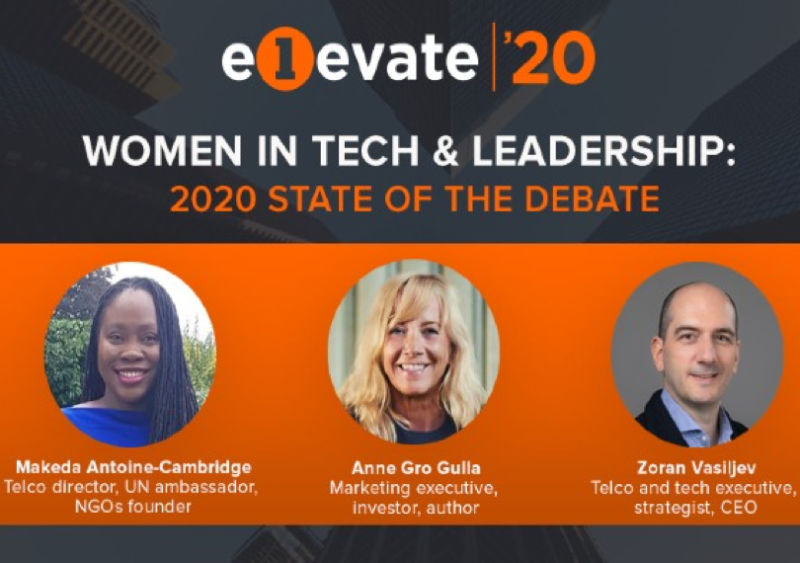author

published-on
11 Sep 2020
tags
A captivating online conversation at Centili earlier this week, as we continue to take on the pressing topics in telco and tech in our Elevate webinar series! This time, our CEO Zoran Vasiljev hosted women of remarkable strength and achievement - Makeda Antoine-Cambridge and Anne Gro Gulla - to look into the 2020 state of the debate about women in leadership and tech.
What do we talk about when we talk about women in tech? What do we avoid? Are men in power still largely unaware of the topic? How to go beyond the 20 percent – both in coding and leadership? Have we properly understood the need for workforce diversity?
The webinar saw participants connecting from Europe, Asia and Africa; the lively 60-minute conversation meandered from root causes and numbers to best practices and back, with glimpses into panellists’ personal experiences and stances.
-Especially in a world of science, technology and ICT, challenges are glaring with the absence of women in executive and leadership roles. There’s been an improvement, but we still have a long way to go. A lot of it has to do with socialization and fixed gender roles, Makeda said, as she shared some of the recent numbers on women in STEM and leadership.
According to McKinsey, if women would be included in all levels of leadership, USD 28 trillion would be added to the global economy by 2025. And yet, according to the East West Center, 2.3 billion women don’t have internet access and are 14 percent less likely than men to have a mobile phone. Women occupy 20% in the board rooms. National Center for Women & Information Technology found that only 11% of the computing and mathematical workforce in 2019 were people of color, with only 3 percent of them being black women.
Holding degrees in computer science and business, Makeda led major telco and tech projects in the Americas, Europe, Africa and Asia, while moving between world’s major business hubs. She served as the 10th Ambassador for Trinidad and Tobago to the United Nations and held several leadership positions at the UN. She was her country’s ambassador to Italy and Austria, has (co)founded several NGOs, and was listed in the Top 100 Most Influential People of African Descent (MIPAD) under 40.
Anne Gro Gulla revealed she hadn’t become a feminist until, at the age 40, she faced gender realities different than those in her home country Norway. Having lived abroad for many years her view of the world was changed - and deeply influenced - by new perspectives on women in business, especially in telco. After that, she came to realise that bias was real and alive, even in her home country.
Anne Gro held top management positions in Telenor and Telia and has worked for companies such as Unilever, Coca-Cola, McCann, and London Business School. She is now a whisky investor, a marketing consultant, a fiction writer, and an advocate for women in ownership and investment.
She described her personal struggle with breast cancer in a widely praised book “Jolted Back on Track: Gratefulness After a Summer with Breast Cancer” (2017). She has lived for many years in Germany, in the US and Sweden.
-It’s not just a feminist issue, it’s a business issue, Anne Gro said. In Nordic countries, men are aware of the topic, which seems to have expanded and is now encompassing questions of women investors and women as owners of companies. In fact, Nordic countries are seeing a growing number of conferences and programs aiming to empower women to become investors.
Speakers agreed that a new generation of female investors, which is in the making, will create a model for young girls to become investors - another occupation traditionally seen as belonging to men.
Even though nowadays we see more women in board levels, there is a sense of disappointment regarding the access to top management positions, panellists said. Some countries like Norway have introduced gender quotas, but those laws did not address the glass ceiling. Even in Norway, only 7 percent of the biggest companies are led by a woman.
And the global mobile industry is not paving the way for women negotiators, international events delegates or conference speakers. In 2019, only 22% of Mobile World Congress attendees were female, 2 percent down when compared to 2018.
-Leadership creates leadership. Gender quotas open the door for women to access higher positions and for other women to follow them, but currently, the decision to do that in the rest of the world lies in the hands of men with power, Makeda said.
With this edition tackling a broader social topic, Centili Elevate webinar series continues to establish itself as a vehicle for discussion, and an agent of change. Keep an eye on the upcoming webinars, in which Centilians will host prominent and knowledgeable industry people in conversations that inspire our thinking and enrich our understanding.





